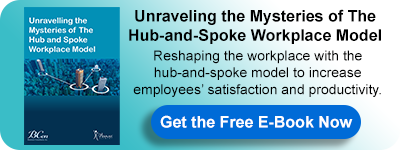Does Hub-and-Spoke Workplace Model Guarantee Employee Satisfaction? (Employee Satisfaction)
Because hybrid workers have greater freedom in terms of when and where they work, they are better equipped to choose the best setting for their needs on any given day. They won't have a long commute or be away from home as much as people who work a regular 9-5 office schedule. According to some research, they may even be more productive than those who work remotely full-time, even though a permanent shift to remote work would make the workforce less productive overall.1
Here's what the data has to say: In remote locations, engagement and well-being operate differently. According to Gallup's February 2022 study, hybrid or entirely remote people have the highest levels of involvement. Fully on-site personnel whose job obligations may be handled at least partially remotely have the lowest level of engagement (i.e., remote-capable workers).
On the other hand, totally remote employees have lower burnout than all other remote-capable employees, whereas entirely on-site employees have the worst burnout. Employee burnout will be vital to monitoring when workplaces shift to hybrid arrangements and issues connected with managing schedules arise. Flexible work arrangements and high employee autonomy can easily transform into a 24/7 work environment that is difficult to disconnect from outside business hours.
According to Gallup data, a lot depends on the role. Not all roles have the same levels of engagement and happiness.2
The growing popularity of hybrid work styles has resulted in an unintended consequence: worry about working remotely. Many employees claim that working from home makes them feel lonely, stressed, and unmotivated, which leads to poorer productivity.
According to a recent poll conducted by InsurTech firm Breeze, 47 percent of remote workers experience remote job anxiety as their teammates return to the office. Many causes contribute to this anxiety, including a fear of missing out, imposter syndrome, and plain old exhaustion.
Sixty-six percent of remote workers with remote job anxiety stated it impacts their overall productivity, and 54 percent said it causes them to feel weary, lethargic, or have trouble sleeping. As a result, several employees have reported experiencing despair, anger, sorrow, and/or panic attacks. 3
Because 25% of respondents indicate their remote work anxiety began after their coworkers returned to the office, the problem may worsen if more organizations convert to a fully hybrid model in the future.
What else might cause employee dissatisfaction?
- Motivational deficiency. Employees who work remotely may experience a loss of motivation. Working on a project with coworkers who have the same goal as you is much easier than working alone.
- Too Many Breaks. Working from home can be tricky since employees must maintain self-control and discipline to complete their tasks. However, certain days may cause them to take unneeded breaks, preventing them from completing their tasks.
- Mental Exhaustion. When flexibility is pushed to its limits, it can become a constraint. Employees who work from home are more likely to forget to clock out, eat, and rest, compromising their work-life balance.
- Cyber-threats. Working from many places can put you in danger of cyber-attacks. Companies using a WFH, or hybrid arrangement must keep their systems safe with regular software upgrades, rigorous password management, and multi-factor authentication, among other things.
- Team partnerships that are far apart. Employees who work in an office and those who work from home may have a strained relationship because they don't see and bond with each other regularly. Because remote workers may feel alienated and may not express their needs to their superiors, this might lead to information gaps.
Remote, Hybrid, and Hub-and-Spoke working possesses many benefits and is a tool for attracting talent and employees. Yet, the disadvantages from an employee's lens cannot be ignored, resulting in a significant toll on management and leadership. They try to maneuver their business through all the uncertainty while attempting to keep their main asset satisfied: their employees.
1Teem, 9 Mar 2022, What are the Pros and Cons of Hybrid Work in the Modern Workplace?, Accessed 19 Apr 2022, https://www.teem.com/blog/pros-and-cons-of-hybrid-work
2Gallup, 31 Mar 2022, Jeremie Brecheisen, Anna Truscott-Smith And Ben Wigert, The Four Essential Dynamics of Hybrid Work, Accessed 20 Apr 2022, https://www.gallup.com/workplace/390944/four-essential-dynamics-hybrid-work.aspx
3 Entrepreneur, 19 Oct 2021, John Boitnott, Remote Work Anxiety is Real. Here's How to Help Employees Who Have It.,Accessed 22 Apr 2022, https://www.entrepreneur.com/article/390341
For more about this topic, download our latest book " Unraveling the Mysteries of The Hub and Spoke Workplace Model " for FREE:
